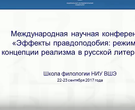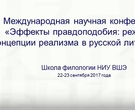- A
- A
- A
- АБB
- АБB
- АБB
- А
- А
- А
- А
- А
- Национальный исследовательский университет «Высшая школа экономики»
- Факультет гуманитарных наук
- Школа филологических наук
- Linguistic complexity. Лекции Эстена Даля (University of Stockholm).
-
Школа
- О школе
- Сотрудники
- Образовательная деятельность
- Научные семинары школы
- Аспирантская школа по филологическим наукам
- Майнор "Инструменты эффективной коммуникации"
-
Проекты школы
-
- Летопись жизни и творчества Б.Л. Пастернака
- Большой проект «Русская литература в социальном измерении: компьютерная платформа СОЦИОЛИТ»
- Всеволод Некрасов. Литературный архив
- Большой проект «Речевые практики»
- Трансформация коммуникативной модели в эго-текстах русского модернизма
- Сравнительное изучение метрического стихосложения на фоне языковой просодии: цифровая аналитическая платформа “Прозиметрон”
-
- Майнор "История литературы"
-
Подразделения
- Лаборатории
- Научно-учебные группы
- Мандельштамовский центр
Адрес: 105066, г. Москва,
Старая Басманная ул., д. 21/4
Т. 1: Разделы I–XI. М.: Русский фонд содействия образованию и науке (Университет Дмитрия Пожарского), 2025.
Новое литературное обозрение. 2025. № 4. С. 76-92.
В кн.: Индоевропейское языкознание и классическая филология - XXIX (1). СПб.: Институт лингвистических исследований РАН, 2025. С. 425-430.
Адрес: 105066, г. Москва,
Старая Басманная ул., д. 21/4
Linguistic complexity. Лекции Эстена Даля (University of Stockholm).
3, 4 и 5 октября 2012 г. на факультете филологии НИУ ВШЭ прошли лекции Эстена Даля (University of Stockholm) на тему «Linguistic complexity».
Annotation
The general topic of the course is the notion of complexity and its application to linguistics. Specific topics to be included are: different ways of understanding complexity both in linguistics and in other disciplines; the notions of maturity and maturation in language change; possible differences among languages in complexity and external conditions that may give rise to them.
Lecture 1. What is complexity? This lecture will treat different ways of understanding the notion of complexity, starting with a general perspective, grounded in information theory, and zooming in on its application to linguistics. The delimitation of complexity against other similar notions such as difficulty will be discussed. The notion of non-linearity as a specific type of complexity in linguistics will be introduced.
Lecture 2. Maturation processes in linguistics. This lecture will discuss how linguistic forms and constructions evolve over time in processes known as grammaticalization and lexicalization. A mature linguistic phenomenon is one that by necessity has a non-trivial prehistory. Mature phenomena tend to involve non-linearity as defined in the first lecture; their development will be outlined.
Lecture 3. Are all languages equally complex? It is often stated in textbooks and other publications in linguistics that there are no differences in complexity between languages, but this thesis has recently been contested by different scholars. In the lecture, the different points of view in this discussion will be outlined. The possible causes of differences in complexity between languages, in particular the role of language contact, will be discussed.
- О ВЫШКЕ
- Цифры и факты
- Руководство и структура
- Устойчивое развитие в НИУ ВШЭ
- Преподаватели и сотрудники
- Корпуса и общежития
- Закупки
- Обращения граждан в НИУ ВШЭ
- Фонд целевого капитала
- Противодействие коррупции
- Сведения о доходах, расходах, об имуществе и обязательствах имущественного характера
- Сведения об образовательной организации
- Людям с ограниченными возможностями здоровья
- Единая платежная страница
- Работа в Вышке
- ОБРАЗОВАНИЕ
- Лицей
- Довузовская подготовка
- Олимпиады
- Прием в бакалавриат
- Вышка+
- Прием в магистратуру
- Аспирантура
- Дополнительное образование
- Центр развития карьеры
- Бизнес-инкубатор ВШЭ
- Образовательные партнерства
- Обратная связь и взаимодействие с получателями услуг
-
http://www.minobrnauki.gov.ru/
Министерство науки и высшего образования РФ
-
https://edu.gov.ru/
Министерство просвещения РФ
-
http://www.edu.ru
Федеральный портал «Российское образование»
-
https://elearning.hse.ru/mooc
Массовые открытые онлайн-курсы
- © НИУ ВШЭ 1993–2025 Адреса и контакты Условия использования материалов Политика конфиденциальности Карта сайта
- Редактору





